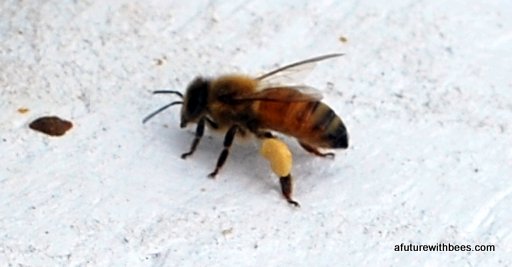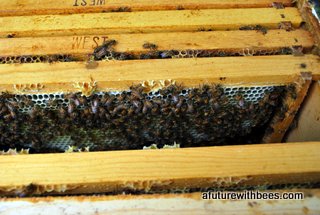![]()
March is one of the hardest months for bees. More beehives starve in March than they do in January and February. Why? Because they are not doing much in Jan. and Feb. so they are not eating much. Just trying to stay warm. How-ever, in late February or early March, they start rearing brood to prepare for the spring harvest of nectar and pollen.
These girls have to be prepared with a large enough population in April to collect all of the food they will need. They need to collect enough food in April, May and June, to hold them for the next 9 months. How many of us could do that?
It is a short time to do a lot of work. So, they need to be proactive and prepare a large population to survive. So, they start rearing brood even though it is still very cold at night and not really very warm some days. Rearing brood takes a lot of resources. Their honey and pollen consumption increases dramatically (I’ve got the figure 700% increase in my mind but I can’t find the reference for this number). Even if it’s not 700%, it is several times more food consumption than they were consuming in the early months of winter. A hive that seems fairly heavy in late February can suddenly start eating everything in sight and starve in March if the weather has not warmed enough to start producing adequate pollen in the trees.
I try to avoid supplemental feeding. It is counter-productive to breeding bees who survive on their own. However, losing a strong hive in early spring because I wouldn’t add a sugar block or pollen patty doesn’t help my program either. So, I mark those hives that need feeding and cut them from the breeding program by using them to raise queen cells from the genetic lines that didn’t need feeding. I reallocate the resource instead of losing it. So keep an eye on the girls and help them if they need it – and log it in your journal so decisions can be made later with good data.

Mistakes I’ve made in March:
- Warm days get me excited and I’ve opened screened bottom boards too soon. The bees are VERY GOOD at regulating temperature – they really don’t need our help. I’ve learned to leave the screen closed until the night time temperatures are consistently above 45 degrees or so. This is normally sometime in May here in the Ozarks.
- I’ve started splits too soon. Unless there is some driving need to produce splits before swarm season, wait. Splits and queen rearing is done in the industry very early to meet package and nuc production demands, not because it needs to be done that early. Most people’s operations do not need to produce splits or queens in risky temperatures. Splits and queens can be raised all summer long.
- Many time we start splits in April to manage the swarming impulse of hives – it is a great way to keep the hives strong, still produce an excellent honey crop, increase the number of hives, and not lose swarms. More on this later. But, splits can be done all summer long. Many sources claim the best queens are reared during June and July instead of April.
- Started messing with my bees too early. When it is warm, I tend to forget that we still have freezing nights ahead of us and even possibly, snow! I have to remind myself to be patient and not go poking around in the hives until April or so. Every time I get into a hive, I set the colony back and it has to re-group. There is simply no sense in me causing them stress when there is nothing productive to gain from it. So, I need to feed them, if necessary, and other-wise leave them alone. (but it’s so hard to resist!)
Hopefully, we will be getting ready to deal with wonderful swarms, like this one by next month!
I hope that sharing my mistakes and experiences will help you understand why these choices are necessary and will help the bees.
